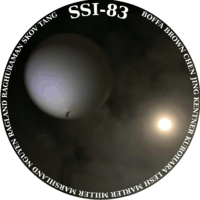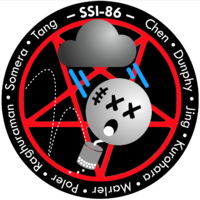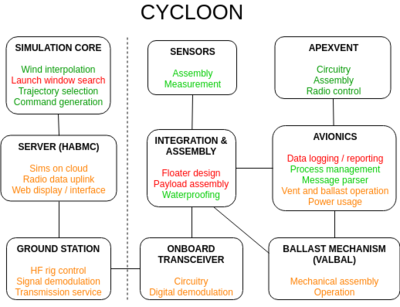Difference between revisions of "Cycloon"
m |
|||
| (4 intermediate revisions by the same user not shown) | |||
| Line 1: | Line 1: | ||
| − | '''Project Cycloon''' is a project on SSI's Balloons team with the aim of designing and operating altitude-controlled, long-endurance, aero-marine balloon platforms for tropical cyclone research. Begun in January 2019, Cycloon has launched payloads on [[SSI-83]], [[SSI-86]], [[SSI-87]], | + | [[File:Cycloon.png|400px|thumb|Project components]] |
| + | '''Project Cycloon''' ({{slack-channel|balloons-cycloon}}) is a core project on SSI's [[Balloons]] team with the aim of designing and operating altitude-controlled, long-endurance, aero-marine balloon platforms for tropical cyclone research. Begun in January 2019, Cycloon has launched five payloads as of August 2019 and has deployed proof-of-concepts of several novel techniques in high-altitude ballooning, as well as giving rise to [[HABSIM]]. Please contact the current co-leads of Cycloon, {{slack-user|bjing}} and {{slack-user|jtang}}, to get involved! | ||
| + | |||
| + | All flight code, simulations, communications protocols, and flight data/analysis for Cycloon are maintained on [https://github.com/stanford-ssi/cycloon GitHub] and repository notifications arrive in {{slack-channel|balloons-cy-git}}. The flight control channel is {{slack-channel|balloons-cy-flops}}. | ||
| + | |||
| + | ==Aims== | ||
| + | Balloons platforms exhibit a very wide range of operating altitudes, making them uniquely well suited to study the [https://en.wikipedia.org/wiki/Tropical_cyclone#Physics_and_energetics primary circulation and energetics] of tropical systems. Understanding such aspects of tropical cyclones is key to improving forecast models of cyclone intensity, whose reliability has lagged significantly behind that of storm track forecasts. [https://en.wikipedia.org/wiki/Hurricane_Michael Hurricane Michael] is a prime example of a storm where poor intensity forecasts resulted in substantial loss of life and property and was a key inspiration for the project. Additionally, balloons platforms can be deployed at significantly lower cost than planes and buoys, and are therefore significantly more scalable. | ||
| + | |||
| + | Key projects being undertaken within Cycloon (and their respective Slack channels) include: | ||
| + | |||
| + | *'''Altitude control:''' Cycloon aims to master and extend the legacy of altitude control on latex balloons pioneered by previous SSI projects. This entails both mechanical and algorithmic aspects. | ||
| + | *'''Marine tether:''' In order to extend the flight endurance beyond the inherent limitations of latex, Cycloon is developing an tether and floater to rest on the surface of the ocean for days at a time. This architecture was successfully demonstrated in [[SSI-83|CY-1]]. | ||
| + | *'''Simulations:''' The need to predict trajectories from California to the Pacific and Atlantic topical basins using the GEFS forecast ensemble has given rise to [[HABSIM]] and its associated work. See also {{slack-channel|balloons-cy-sims}}. | ||
| + | *'''Payload:''' Ultimately, the purpose of the balloon platform will be to carry low-cost, lightweight radiosondes. See {{slack-channel|balloons-cy-payload}}. | ||
| + | *'''Communications:''' To augment data uplink rates, Cycloon is developing a skywave communications system and protocol in {{slack-channel|balloons-cy-comms}}. | ||
| + | *'''Avionics:''' Core avionics work involving circuit board design and flight code is undertaken in {{slack-channel|balloons-cy-avionics}}. | ||
| + | *'''Apexvent:''' Overcoming difficulties with altitude control at the later stages of the mission requires the development of a top-mounted vent. See {{slack-channel|balloons-cy-apexvent}}. | ||
| + | *'''ZPB:''' Polyethylene envelopes have intrinsically more desirable properties compared to latex envelopes. In-house manufacture of such envelopes is being explored in {{slack-channel|balloons-cy-zpb}} and was first demonstrated in [[SSI-90|CY-4]]. | ||
| + | ==Missions== | ||
| + | {| class="wikitable" style="margin: auto;" | ||
| + | !|Number | ||
| + | !|Link | ||
| + | !|Launch date | ||
| + | !|Launch site | ||
| + | !|Flight duration | ||
| + | !|Notes | ||
| + | |- | ||
| + | |1 | ||
| + | ! [[File:Ssi83.png|200px|frameless|link=SSI-83]] | ||
| + | | April 17, 2019 | ||
| + | | Pigeon Point | ||
| + | | 60.5 hours | ||
| + | | Demonstration of long-endurance marine tether. Float-only profile. Lost off the coast of San Luis Obispo county. | ||
| + | |- | ||
| + | |2 | ||
| + | ! [[File:SSI-86.png|200px|frameless|link=SSI-86]] | ||
| + | | May 18, 2019 | ||
| + | | Hollister | ||
| + | | 5 hours, 12 minutes + 5 hours, 40 minutes | ||
| + | | Latex ballast control. Flight through inclement weather and resumption of flight after 24 hours. Final location in Yosemite National Park. | ||
| + | |- | ||
| + | |3 | ||
| + | ! [[SSI-87]] | ||
| + | | June 1, 2019 | ||
| + | | Le Grand | ||
| + | | | ||
| + | | Latex full altitude control. Recovered from near Firebaugh, California. | ||
| + | |- | ||
| + | |4 | ||
| + | ! [[SSI-90]] | ||
| + | | July 27, 2019 | ||
| + | | Hollister | ||
| + | | Unknown | ||
| + | | First flight of in-house constructed polyethylene envelope. Telemetry error; final location unknown. | ||
| + | |- | ||
| + | |5 | ||
| + | ! [[SSI-91]] | ||
| + | | August 5, 2019 | ||
| + | | Hollister | ||
| + | | 2 hours | ||
| + | | Second flight of in-house constructed polyethylene envelope. Final location near Tracy, CA; recovery pending. | ||
| + | |} | ||
| + | |||
[[Category: High Altitude Balloons]] | [[Category: High Altitude Balloons]] | ||
Revision as of 07:15, 12 August 2019
Project Cycloon (![]() #balloons-cycloon
#balloons-cycloon ![]() @{{{display-name}}}
@{{{display-name}}} ![]() @{{{display-name}}}
@{{{display-name}}}
All flight code, simulations, communications protocols, and flight data/analysis for Cycloon are maintained on GitHub and repository notifications arrive in ![]() #balloons-cy-git
#balloons-cy-git ![]() #balloons-cy-flops
#balloons-cy-flops
Aims
Balloons platforms exhibit a very wide range of operating altitudes, making them uniquely well suited to study the primary circulation and energetics of tropical systems. Understanding such aspects of tropical cyclones is key to improving forecast models of cyclone intensity, whose reliability has lagged significantly behind that of storm track forecasts. Hurricane Michael is a prime example of a storm where poor intensity forecasts resulted in substantial loss of life and property and was a key inspiration for the project. Additionally, balloons platforms can be deployed at significantly lower cost than planes and buoys, and are therefore significantly more scalable.
Key projects being undertaken within Cycloon (and their respective Slack channels) include:
- Altitude control: Cycloon aims to master and extend the legacy of altitude control on latex balloons pioneered by previous SSI projects. This entails both mechanical and algorithmic aspects.
- Marine tether: In order to extend the flight endurance beyond the inherent limitations of latex, Cycloon is developing an tether and floater to rest on the surface of the ocean for days at a time. This architecture was successfully demonstrated in CY-1.
- Simulations: The need to predict trajectories from California to the Pacific and Atlantic topical basins using the GEFS forecast ensemble has given rise to HABSIM and its associated work. See also
 #balloons-cy-sims
#balloons-cy-sims - Payload: Ultimately, the purpose of the balloon platform will be to carry low-cost, lightweight radiosondes. See
 #balloons-cy-payload
#balloons-cy-payload - Communications: To augment data uplink rates, Cycloon is developing a skywave communications system and protocol in
 #balloons-cy-comms
#balloons-cy-comms - Avionics: Core avionics work involving circuit board design and flight code is undertaken in
 #balloons-cy-avionics
#balloons-cy-avionics - Apexvent: Overcoming difficulties with altitude control at the later stages of the mission requires the development of a top-mounted vent. See
 #balloons-cy-apexvent
#balloons-cy-apexvent - ZPB: Polyethylene envelopes have intrinsically more desirable properties compared to latex envelopes. In-house manufacture of such envelopes is being explored in
 #balloons-cy-zpb
#balloons-cy-zpb
Missions
| Number | Link | Launch date | Launch site | Flight duration | Notes |
|---|---|---|---|---|---|
| 1 | 
|
April 17, 2019 | Pigeon Point | 60.5 hours | Demonstration of long-endurance marine tether. Float-only profile. Lost off the coast of San Luis Obispo county. |
| 2 | 
|
May 18, 2019 | Hollister | 5 hours, 12 minutes + 5 hours, 40 minutes | Latex ballast control. Flight through inclement weather and resumption of flight after 24 hours. Final location in Yosemite National Park. |
| 3 | SSI-87 | June 1, 2019 | Le Grand | Latex full altitude control. Recovered from near Firebaugh, California. | |
| 4 | SSI-90 | July 27, 2019 | Hollister | Unknown | First flight of in-house constructed polyethylene envelope. Telemetry error; final location unknown. |
| 5 | SSI-91 | August 5, 2019 | Hollister | 2 hours | Second flight of in-house constructed polyethylene envelope. Final location near Tracy, CA; recovery pending. |
